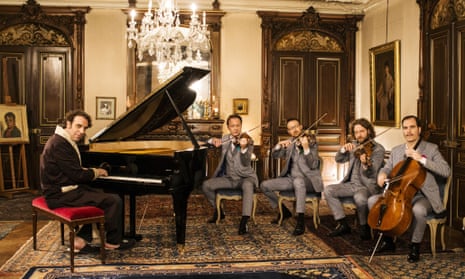I grew up with my grandfather teaching me the great European tradition of composers. But when I wasn’t at the piano I was watching Lionel Richie dance on the ceiling, and I told myself there had to be a way to combine these two worlds. All music is connected, and I’ve reflected on what the equivalencies might be between my favorite composers and my pop heroes. Composers were our first musical celebrities, and the 19th century brought us the idea of a “musical genius”, a role which I happen to play on stage. If these master composers were to have been pop icons or MCs, we might find that not much has changed since a demonic Liszt broke piano strings back in the 1850s.
The sexual virtuoso: Lizst = Jimi Hendrix
The first undeniable piano virtuoso, Liszt invented the single-artist piano concert (in London no less), even moving the piano to its current standard side-facing, audience-welcoming position. He was tall as a proud phallus, wore a long mane of blond hair, and made unwavering eye contact with the ladies in his audience. They swooned accordingly. He gyrated, he exaggerated. Liszt sexualised music, broke piano strings on a regular basis, and by openly courting a demonic image, he paved the way for Jimi Hendrix’s guitar-burning. Heavy metal certainly wouldn’t exist without virtuosi like Liszt and his violin-playing counterpart Paganini. It’s a cliche by now, but they truly were the first rock stars.
The man-child: Mozart = Michael Jackson
Mozart, the prototype for the child prodigy who missed out on growing up, whose abusive stage-dad put him to gruelling work touring Europe to perform in front of the aristocracy. Music just poured out of Mozart at an extremely high rate and quality. His improvisng at the keyboard was the musical moonwalk of its day. For his part, fellow man-child Michael Jackson turbocharged the idea of a pop star and created the term “megastar”. The hyperactive, goofy Amadeus was the first composer to scare the hell out of all other composers. By living out their childhoods through their art, Mozart and Jacko showed us what seemed previously impossible.
The suffering genius: Chopin = Morrissey
And here we have the sensitive Romantic victim, whose misery is front and centre in their mythology. Chopin embodied a kind of sickly, androgynous glamour that presaged Oscar Wilde and his pop-descendant Morrissey. Morrissey’s sexual alienation is a kind of sacrificial, neurotic handicap, and for better or worse we find emotional cripples irresistible. It all began with Beethoven, whose deafness enhanced his image as the Van Gogh of music, possessing a tragic flaw that allows him to be transcendent. Sensitivity sells, and we could even argue that Drake, in his sad rapper-ly way, suffers with the worst of them.
The eccentric outsider: Erik Satie = Brian Eno
Erik Satie was far ahead of his time, anticipating ambient music, situationism and pop art all several decades before they hit. His foppish tweed-dandy style marked him as a beloved character in the cabaret scene of early 20th-century Paris. But he was such an oddball, the musical establishment just couldn’t respect his ideas (music as “furniture” was one of them). Thankfully, his French peers Debussy and Ravel were fans. His Gymnopédies are little, hypnotic, minimalist pop gems that some (rightly) say influenced my piano work. But his true heir is Brian Eno, who carries this egghead tradition forward, inventing oblique strategies and writing music for airports.
The delusional god: Richard Wagner = Kanye West
Some musicians have a kind of disease of ambition (I myself am recovering from a long affliction). Wagner went further than most to live out his fantasies - it went beyond his music and success. He was a serial adulterer, an anti-semite and a judgmental pontificator. And a genius. Wagner represents for the “never-enoughs” that we see reflected in today’s excess and hip-hop revenge fantasies. It wasn’t enough for Wagner to write great music and have his operas produced in a theatre devoted only to his work, he tried to live as a god, as Kanye West as similarly admitted to doing. As the Grammys incident proved, Kanye has a knack for inserting himself into the conversation, and makes it all about him. Thank Wagner for a lifetime of Kanye making headlines for extra-musical achievements.
- Chambers is out on 23 March on Gentle Threat; Chilly Gonzales and the Kaiser Quartett peform at Milton Court, London, 11-13 April.
